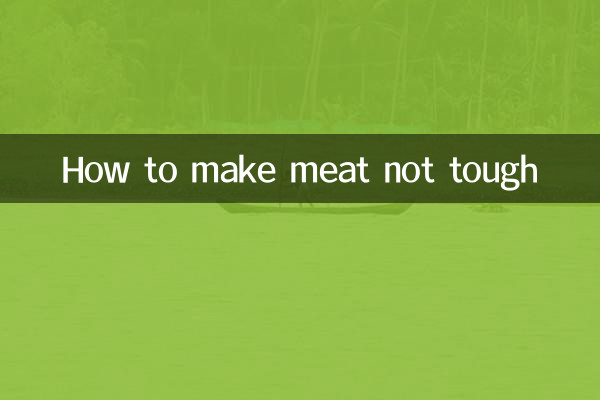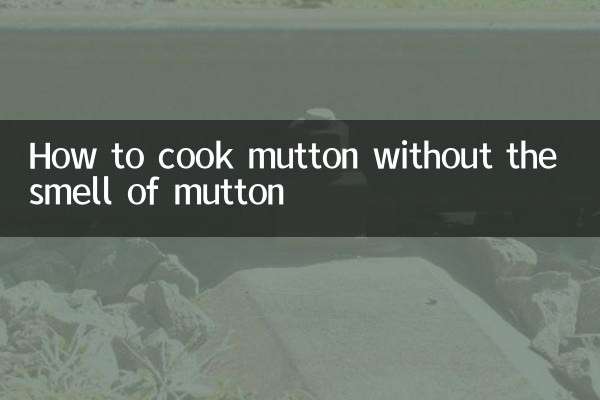How to cook meat without being tough: hot topics and practical tips on the Internet
Recently, the topic of "how to make meat more tender" has sparked heated discussions on major social platforms and cooking forums. Whether you are a housewife, a cooking enthusiast or a professional chef, they are all discussing how to avoid the tough taste of meat. This article will combine the hot discussions on the Internet in the past 10 days to summarize practical tips and structured data for you to help you easily solve this problem.
1. Why does meat become tough?

The main reasons why meat becomes tough include overheating, improper selection of materials, and lack of pretreatment. The following are some of the most common reasons discussed throughout the Internet:
| Reason | Proportion | solution |
|---|---|---|
| overheating | 45% | Control the heat and avoid long-term high-temperature cooking |
| Not marinated or improperly marinated | 30% | Pickle with acidic seasonings (such as lemon juice, vinegar) or enzymes (such as pineapple, papaya) |
| Improper selection of materials | 15% | Choose the appropriate meat cut (e.g. tenderloin, brisket) |
| Not tenderized | 10% | Physical tenderization (beating, cutting) or chemical tenderization (baking soda) |
2. Meat tenderization techniques that are hotly discussed on the Internet
Based on hot topics in the past 10 days, the following are the meat tenderization methods most recommended by netizens:
| method | heat index | Suitable for meat |
|---|---|---|
| Baking soda pickling method | ★★★★★ | Beef, pork |
| slow cook | ★★★★☆ | Steak, chicken breast |
| Fruit enzyme tenderization | ★★★☆☆ | All types of red meat |
| Starch coating method | ★★★☆☆ | Pork slices, beef slices |
3. Solve the problem of meat hardening step by step
1. Material selection stage:
Choosing the right cut of meat is key. For example, parts such as beef tenderloin and pork plum blossoms are inherently tender, while beef brisket, pig trotters, etc. require special treatment.
2. Preprocessing stage:
(1) Cut meat against the grain: cut off muscle fibers to make the texture more tender.
(2) Marinate: Use basic seasonings such as salt, sugar, soy sauce, and add a small amount of baking soda (1/4 teaspoon per 500 grams of meat).
(3) Physical tenderization: beat with the back of a knife or use a meat mallet.
3. Cooking stage:
(1) Control the heat: Stir-fry quickly over high heat or simmer over low heat to avoid long-term cooking over medium heat.
(2) Temperature control: When frying steak, first use high temperature to lock in the juice, then turn to medium-low temperature to achieve the desired doneness.
(3) Moisture retention: A small amount of water or broth can be added to prevent excessive loss of moisture.
4. Special processing of different meats
| meat | Best Tenderization Method | Things to note |
|---|---|---|
| Beef | Pickled in baking soda + cut against the grain | Marinate for no more than 30 minutes |
| Pork | Starch coating + quick frying | Control the frying time within 3 minutes |
| chicken | Soak in salt water + cook at low temperature | The cooking temperature of chicken breast should not exceed 75℃ |
| mutton | Pickled with acidic seasoning | Can be marinated with yogurt or lemon juice |
5. Exclusive secret recipes that are effective according to actual testing by netizens
1.Beer tenderizer method: Add a small amount of beer when pickling, the enzymes in it can effectively break down protein.
2.Tea-leaf meat tenderization method: Use soaked tea leaves to wrap meat. The tannins in the tea leaves have a tenderizing effect.
3.papain method: Puree raw papaya, mix with meat and marinate for 20 minutes.
6. Scientific principles and precautions
1. Baking soda (sodium bicarbonate) relaxes the protein structure by changing the pH value of the meat.
2. Acidic substances (such as vinegar, lemon juice) can decompose collagen, but excessive amounts will cause the meat to become rotten.
3. Physical tenderization is achieved by destroying the muscle fiber structure and is suitable for thicker cuts of meat.
4. All tenderization methods require time control, and excessive processing will lead to poor meat quality.
With the methods and tips above, you're sure to make tender and delicious meat dishes. Remember, cooking is a science as well as an art. Try more and learn more, and you will master the secret of making meat not tough!

check the details

check the details